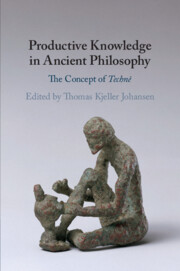Book contents
- Productive Knowledge in Ancient Philosophy
- Productive Knowledge in Ancient Philosophy
- Copyright page
- Contents
- Contributors
- Acknowledgements
- List of Abbreviations
- Introduction
- Chapter 1 Protagoras on Political Technê
- Chapter 2 Dynamic Modalities and Teleological Agency
- Chapter 3 Technê As a Model for Virtue in Plato
- Chapter 4 Crafting the Cosmos
- Chapter 5 Aristotle on Productive Understanding and Completeness
- Chapter 6 Technê and Empeiria
- Chapter 7 The Stoics on Technê and the Technai
- Chapter 8 The Epicureans on Technê and the Technai
- Chapter 9 The Sceptic’s Art
- Chapter 10 Plotinus on the Arts
- Chapter 11 Productive Knowledge in Proclus
- Bibliography
- General Index
- Index Locorum
Chapter 4 - Crafting the Cosmos
Plato on the Limitations of Divine Craftsmanship
Published online by Cambridge University Press: 14 January 2021
- Productive Knowledge in Ancient Philosophy
- Productive Knowledge in Ancient Philosophy
- Copyright page
- Contents
- Contributors
- Acknowledgements
- List of Abbreviations
- Introduction
- Chapter 1 Protagoras on Political Technê
- Chapter 2 Dynamic Modalities and Teleological Agency
- Chapter 3 Technê As a Model for Virtue in Plato
- Chapter 4 Crafting the Cosmos
- Chapter 5 Aristotle on Productive Understanding and Completeness
- Chapter 6 Technê and Empeiria
- Chapter 7 The Stoics on Technê and the Technai
- Chapter 8 The Epicureans on Technê and the Technai
- Chapter 9 The Sceptic’s Art
- Chapter 10 Plotinus on the Arts
- Chapter 11 Productive Knowledge in Proclus
- Bibliography
- General Index
- Index Locorum
Summary
This chapter discusses the use of technê to characterize the creator god in Plato’s Timaeus. Timaeus explains how a divine craftsman, the Demiurge, made the whole cosmos as a living being. He created the heavenly bodies, but left the creation of human and other mortal beings to these ‘lesser’ gods. But if the Demiurge was the best of all craftsmen, seeking to make the finest cosmos possible, why did he not make the mortal beings too? Having outlined Plato’s conception of craft, Johansen explains how this problem, which he calls the ‘technodicy’, arises for Timaeus, contrasting it with the classical theodicy. The Demiurge’s creation is limited by his craft. Timaeus therefore assigns another craft to the lesser gods to produce mortal beings. However, even this craft prevents the lesser gods from directly producing non-human animals, and so the problem is reiterated. The issue is sought to be resolved by making humans themselves responsible for their own reincarnation as lower animals. Timaeus’ position is comparable to the view in Laws X: the lesser gods, consistent with their role as craftsmen, have overall responsibility for the organization of lower kinds of living being, without causing any particular beings to belong to particular kinds.
- Type
- Chapter
- Information
- Productive Knowledge in Ancient PhilosophyThe Concept of <I>Technê</I>, pp. 86 - 108Publisher: Cambridge University PressPrint publication year: 2021
- 1
- Cited by



